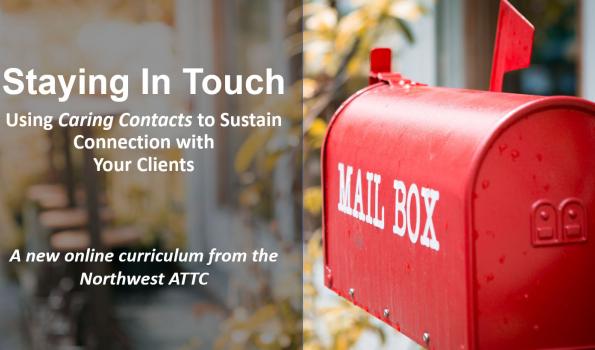This page features resources developed by the Northwest ATTC related to issues of diversity, equity, and inclusion, as well as some additional materials that may be of interest to those exploring this topic.

This primer was developed by the Peer Cultural Cooperative to serve as an entry level cultural reference for Peer Support Specialists and Recovery Coaches working in both substance use disorder and mental health fields. Sections include:
An appendix features a wealth of additional resources, including glossaries of terms and acronyms, references, and tools.

Staying in Touch: Using Caring Contacts to Sustain Connections with Your Clients is a one-hour online curriculum that describes a low-threshold, Caring Contacts intervention designed to help providers reduce client self-harm, increase feelings of self-efficacy, and fill treatment gaps due to health disparities or other challenges.
This curriculum is self-paced, outlines the scientific support for this approach to reduce client isolation and potential self-harm, focuses in part on special circumstances and populations that can be hard to engage and retain in care, and includes concrete examples of Caring Contacts, as well as modifiable templates that can be downloaded and adapted for any organization's use. Download the curriculum here.

In Fall 2020, the Northwest ATTC sponsored three online presentations as part of the University of Washington’s course HSERV 556, "Tobacco-Related Health Disparities and Social Justice":
Find video recordings, slides, and Q&As here.

Jovan Hollins, MBA, D/E/I Consultant (March 2022)
In this session, Mr. Hollins talked about the importance of understanding self-awareness, getting knowledge of those whom you serve, developing skills to build trust and engage, as well as finding ways to take action or advocate for change. Awareness, Knowledge, Skills, Action/Advocacy are the pillars in which we create the frameworks for deeper connections, and fighting systems of oppression. Our desire to serve our clients equitably and identify opportunities for more diverse teams will be a support to overall success. Recording and slides
Stacy M. Rasmus, PhD, Director of the Center for Alaska Native Health Research at the University of Alaska Fairbanks (September 2020)
The Qungasvik (kung-az-vik) "Toolbox" is a multilevel strength-based intervention developed by Yup'ik Alaska Native communities to reduce and prevent alcohol use disorder (AUD) and suicide in youth and young adults at highest risk. Recording and slides
Adam Viera, PhD student, Yale University School of Public Health (March 2020)
Crystal methamphetamine use is growing increasingly common among men who have sex with men (MSM) in the northeastern U.S. and is an important public health concern. This webinar shared preliminary themes emerging from a qualitative study of MSM who use crystal methamphetamine, presenting important lessons for treatment organizations looking to address crystal meth use among MSM. Recording and slides
Joe Glass, PhD, MSW, Kaiser Permanente WA Health Research Institute (July 2018)
This webinar examined the stigma of substance use disorders, reviewing evidence about how stigma shapes healthcare experiences and treatment seeking, and discussing practical issues such as why and how to avoid using stigmatizing language. Recording and slides
For more webinars in our series, visit our Northwest ATTC Webinar Series page.
ATTC Building Health Equity and Inclusion
This page hosts a curated list of all the ATTC regional network center-developed products and resources related to building health equity and inclusion.
MHTTC Racial Equity & Cultural Diversity
This webpage includes a compilation of products and resources on cultural responsiveness, racial equity, and cultural diversity for the mental health workforce, curated by the MHTTC Cultural Responsiveness Working Group.
PTTC Cultural Responsiveness: Building Health Equity and Inclusion
This resource list was developed by the PTTC Culturally & Linguistically Appropriate Practices Work Group, and represents a compilation of resources produced by the PTTC Network to help individuals understand the impact of culture and identity in prevention efforts.
Stages of Change Model for Diversity, Equity, and Inclusion (DEI) Best Practices in Addiction Treatment Tool (NAATP)
This tool was created in consultation with the National Association of Addiction Treatment Providers (NAATP) DEI Advisory Committee to help providers -- both those just starting this work and those who are well on their way -- to identify areas for growth, develop action steps, and gauge their process toward promoting health equity, establishing a more diverse staff and client base, and developing more inclusive work and clinical environments. Learn more about it in this NAATP blog post and webinar.